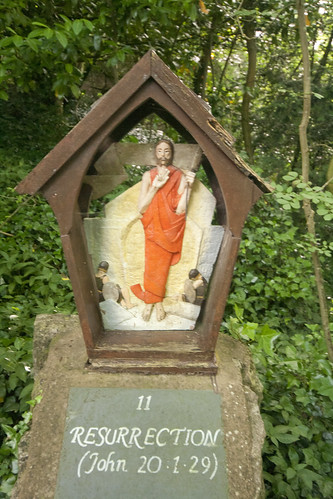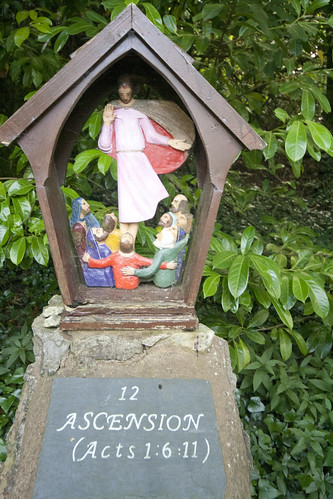 In reviewing the work of Mgr Basil Loftus - or, as he now prefers to be known,
In reviewing the work of Mgr Basil Loftus - or, as he now prefers to be known, He writes about it most Easters, and I have before me his articles for April 8th 2010, April 17th 2011, and April 11th 2012. He preferred to cover other topics in 2013. Perhaps that was wise.
April 8th 2010
What we have today in the New Testament is a combination of three elements: historical facts, early teaching, and oral tradition.
What about the innerancy of Scripture, reaffirmed by the Second Vatican Council? Loftus neglects to mention this.
There is also the simple fact that we don't have it as an historical fact that Christ rose on the 'third day'. We only know that he had risen by then, because that is when the tomb was found to be empty.
So the fact that Christ rose on the third day, which we find in numerous passages of scripture (eg Acts 10:40), isn't a fact?
Luke in his gospel has Christ ascending to Heaven on the same day that he rose from the dead (chapter 24), while the same author, writing in the Acts of the Apostles, has the Ascension taking place 40 days after the Resurrection (chapter 1).
 No: Luke 24 says no such thing, though the events are presented in a telescoped fashion. It is hardly credible that Luke would contradict himself, and the more detailed account in Acts disambiguates the brief summary in the Gospel. But Mgr Loftus seems rather keener on the two events happening, not just on the same day, but more or less indistinguishably. For the rest of the article he talks about 'Christ's Resurrection/Ascension event'.
No: Luke 24 says no such thing, though the events are presented in a telescoped fashion. It is hardly credible that Luke would contradict himself, and the more detailed account in Acts disambiguates the brief summary in the Gospel. But Mgr Loftus seems rather keener on the two events happening, not just on the same day, but more or less indistinguishably. For the rest of the article he talks about 'Christ's Resurrection/Ascension event'.In other words, the Resurrection/Ascension is our invitation to the Feast in Heaven...
the Resurrection glorifies Jesus. ...Effectively, Jesus has been enthroned in Heaven.
Loftus fails to mention the strong and repeated emphasis in the Gospels of Jesus return to physical life: the fact that he can be touched, and that he eats. Perhaps these come into the category he has invented, of things you needn't take too much of in the Gospels:
It has been contaminated, for instance, by differing details such as who went to the tomb.
Contaminated? The Gospels?
April 17th 2011
Here Loftus makes the bizarre claim that the New Testament does not attest to the Resurrection as a historical event.
Yes, there is mention of the empty tomb. But that doesn't historically mean that Christ rose from the dead - just that his body was not there. All that historical science can say about Christ's resurrection is that the disciples believed in it and witnessed to it. The Scripture account of the resurrection is merely an account of that witness.
 Clearer, now? So when Acts 10:40 reports St Peter saying that Jesus rose from the dead after three days, when Matthew 28:6 reports that the Angel said that 'He is risen' to the women, when St Paul tells us on various occasions that Jesus rose from the dead, we cannot infer 'historically' that this took place, for these are reports of witness to the Resurrection.
Clearer, now? So when Acts 10:40 reports St Peter saying that Jesus rose from the dead after three days, when Matthew 28:6 reports that the Angel said that 'He is risen' to the women, when St Paul tells us on various occasions that Jesus rose from the dead, we cannot infer 'historically' that this took place, for these are reports of witness to the Resurrection.But how is this different from the witness to the empty tomb, which the Evangelists give us? Loftus hasn't really thought this one through. Each of the four Gospels is simply what the Evangelist, in each case, is telling us: it is witness. But it seems Loftus is more comfortable accepting the witness to some historical facts - like the empty tomb - than to others - like the physical resurrection of Our Lord.
I can't tell if he blushed when he wrote what came next, but Loftus actually quotes the notorious Dutch Catechism on the subject.
The way that the resurrection, as such, happened is hidden from all human sight and outside all scientific verification.
This is the document deemed so defective by the Vatican that the Dutch bishops were obliged to add 50 pages of clarifications to it (though they never fully complied with the demand for corrections). For our purposes, what about the scientific verification of St Thomas the Apostle, who wanted, and was able, to put his fingers into the wounds?

Further on, Loftus repeats the claim that St Luke's Gospel has the Ascension on the same day as the Resurrection - the differences between the narratives 'do not matter, because the New Testament is not a historical account of the resurrection.'
Again, what the Resurrection of Our Lord actually means is left unclear. Is it a 'historical event' of which there is sadly no 'historical account', or some kind of non-historical event, which receives an entirely appropriate non-historical account? Loftus only hints what he thinks, but he is very careful, again, to ignore the Gospels' emphasis on its physical reality. On the contrary, he quotes:
The meaning of Christ's resurrection is not the reanimation of a corpse. ...It is rather that the Son of God, made man, through his death on the cross, came to be exalted as the right hand of the Father in his historical-bodily being.
Well, I can tell you that, after reciting the Nicene Creed all my life, I'll be mightily disappointed if my corpse is not reanimated.
April 8th 2012
Now we have a little clarification.
Christ did not return to life through his Resurrection, any more than we shall return to life when we share in that Resurrection. Rather, Christ entered into a new life, just as we too shall be transformed and enter into a new life.
And so out comes the usual misleading use of St Paul's term 'spiritual body' (1 Cor. 15:44). Why didn't Loftus think of this before? It is a perfect way to insinuate that the Resurrection was not a physical, historical event, but something mystical and spiritual. But only if you - yet again - ignore all the stuff in the Gospels about the physicality of the Risen Lord, touching Him, His eating. So that is what Loftus does.
What would it cost Mgr Loftus to reassure his readers that Christ rose from the dead physically, and that although His body was glorified, it was still a physical body, tangible, able to eat, present in one place in a sense that it was not present in another? It would cost him nothing. But he refuses to say it.
 It is pretty clear that he has a problem with this aspect of the Church's teaching. Whatever orthodox spin he might put on his words if challenged does not change the effect that they must have on the mostly unsophisticated readers of the Catholic Times. The fact that he is allowed to set out his confused and misleading screeds in a Catholic newspaper year after year is a scandal.
It is pretty clear that he has a problem with this aspect of the Church's teaching. Whatever orthodox spin he might put on his words if challenged does not change the effect that they must have on the mostly unsophisticated readers of the Catholic Times. The fact that he is allowed to set out his confused and misleading screeds in a Catholic newspaper year after year is a scandal.Photos: The Glorious Mysteries of the Rosary, at the Fransiscan Retreat Centre at Pantasaph. More here.
Perhaps he'd be more at home as Bishop of Durham?
ReplyDeleteIn the meanwhile I suggest, if one comes across him in the street, to just call him 'Basil' with the intonation Mrs Fawlty uses for this name.
I suggest just nodding politely and moving swiftly on.....
ReplyDeleteVery engaging posts Dr. Shaw
This comment has been removed by the author.
ReplyDelete"The way that the resurrection, as such, happened is hidden from all human sight and outside all scientific verification."
ReplyDeleteHe certainly means this to cast doubt on the resurrection. However, even those who believe in it are obliged to admit this statement is technically true. The resurrection cannot be scientifically verified at this late date and therefore it must be taken on faith. The faithful will believe that it was scientifically verified well enough when doubting Thomas put his fingers inside the nail scars of Jesus' hands and feet and the gash in his side. Everyone else will demand that they be allowed to scientifically verify it the same way.
It's the distinction Loftus makes between the Empty Tomb ('fact') and the Resurrection ('unverifiable') which doesn't make any sense.
ReplyDeleteIt makes sense in the sense that the tomb could be empty for a different reason. This is where faith comes in. If the resurrection were an unquestionably provable fact, there would be no need for faith. Those who don't have faith in the resurrection will always say the body was stolen by the disciples or some such. I actually saw one claiming once that the disciples had taken "Unless you eat my flesh you have no life in you" too literally and had eaten Jesus' body. There are plenty of possible explanations for those who don't take it on faith.
DeleteWhat doesn't make sense, however, is for a Catholic to be writing the kind of article he wrote.
DeleteWhy do you believe in the empty tomb? How can you prove that? The evidence for the Empty Tomb and the Resurrection are exactly equivalent.
DeleteYes, good point. I missed that. That has to be taken on faith too. Unless you believe the text is the word of God there is no reason to believe there ever was an empty tomb.
ReplyDelete"What would it cost Mgr Loftus to reassure his readers that Christ rose from the dead physically...
ReplyDeleteBecause this is the sort of thing that people in polite, educated, modern society find to be a bit too much, and above all, it seems, Msgr. Loftus (desperately) does not wish to be thought a superstitious bore.
We've seen this story unfold too many times, alas.